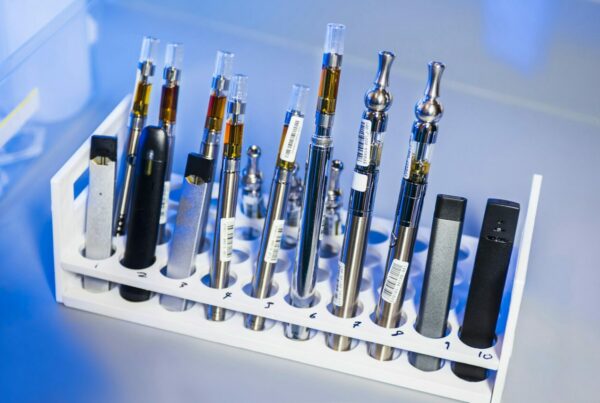N, N-Dimethyltryptamine (DMT) is a substance commonly found in both flora and fauna, renowned for its intense yet brief psychedelic effects upon ingestion.
There is a growing body of evidence to suggest that DMT, which occurs naturally within the body, plays crucial roles in both the peripheral and central nervous systems, potentially acting as a neurotransmitter.
DMT can trigger intense psychedelic experiences, but it generally doesn’t result in many adverse side effects, except potential cardiovascular issues when administered in large doses through injection.
Let’s explore DMT and its various roles, ranging from recreational use to its intriguing potential in scientific research and therapeutic applications.

DMT: A Brief Introduction
| Attribute | Explanation |
| Name | N, N-Dimethyltryptamine (DMT) |
| Classification | Indole alkaloid |
| Occurrence | Naturally found in various plants and animals |
| Psychoactive Effects | Produces intense psychedelic experiences when ingested. |
| Method of Consumption | Can be smoked, injected, or orally consumed. |
| Duration of Effects | Short-term, typically lasting from 5 to 30 minutes. |
| Chemical Structure | Comprises a tryptamine core with two methyl groups attached to the amine nitrogen atom. |
| Metabolism | Rapidly metabolized by the body, decomposed by monoamine oxidase (MAO). |
| Cultural Use | Historically used in various ceremonial and shamanic rituals by indigenous cultures. |
| Other names | Dimitrifantasiabusinessman’s tripBusinessman’s special45-minute psychosisspiritual molecule |
The Importance of DMT in Mental Health
N, N-Dimethyltryptamine (DMT), a compound well-known for its potent psychedelic effects, is gaining attention for its potential benefits to mental health. Despite being traditionally associated with inducing powerful visionary experiences, recent research points towards a connection between DMT and mental well-being.
Effects on Psychological and Emotional Enhancing Wellness
DMT is widely recognized for its psychedelic effects, which can trigger intense emotional reactions and alter states of consciousness. This opens potential therapeutic avenues for addressing mental health challenges, facilitating emotional processing, and providing new perspectives on personal traumas.
Brain Function and Neuroplasticity
Research suggests that DMT might influence neuroplasticity, thereby enhancing the brain’s ability to adapt and reorganize. Investigating its impact on synaptic plasticity and neural connectivity may lead to potential treatments for conditions associated with neural imbalance.
Potential Mental Health Therapies
Early studies underscore DMT’s potential in treating disorders such as depression, addiction, and PTSD. The drug’s ability to induce mystical or spiritual experiences could offer a unique psychotherapy approach, helping to reframe negative thought processes.
Understanding the natural occurrence of DMT within the body and its role in mental health resilience, stress response, and psychological wellness is vital. Gaining insights into how the body regulates internal DMT levels could lead to novel therapeutic strategies.
DMT’s Role in Mental Health Disorders
| Mental Health Disorder | Description | Effectiveness of DMT | Potential Benefits |
| Depression | A mood disorder marked by persistent sadness, lack of interest, and reduced motivation | Early research suggests DMT could alleviate symptoms by inducing deeply emotional experiences. | The rapid onset of DMT and its capacity to provoke transformative experiences could offer innovative therapeutic approaches to reshape negative thought patterns and enhance emotional processing |
| Post-Traumatic Stress Disorder (PTSD) | A mental health condition triggered by traumatic events, resulting in flashbacks, severe anxiety, and intrusive thoughts | Preliminary research points to DMT’s potential for managing symptoms by inducing spiritual or mystical experiences that could help patients reframe traumatic memories | DMT’s ability to induce altered states of consciousness could assist in emotional processing and provide a fresh perspective on traumatic experiences |
| Addiction | A complex disorder characterized by compulsive engagement in rewarding stimuli, despite adverse consequences | Some research suggests DMT’s potential in breaking addictive patterns and reducing cravings for substances | DMT’s ability to provoke intense and transformative experiences might aid individuals in transforming their behavioral patterns and addressing the root causes of their addiction |
Approach to Using DMT
DMT, recognized for triggering short yet potent psychedelic experiences, can be administered in a variety of ways. The choice of administration often relies on the desired intensity and length of the experience.
Smoking:
DMT, when inhaled in a pipe or vaporized, requires careful heat management to prevent the compound from overheating and getting burnt. The induction of a psychedelic experience is nearly instantaneous when DMT is smoked, usually lasting between 5 to 15 minutes.
Oral Intake:
Consuming DMT orally leads to slower onset effects that last significantly longer, often several hours. This is due to the slower metabolism of DMT when combined with an MAOI.
Injection:
DMT can be directly injected into the bloodstream for rapid and powerful effects.
This method results in an immediate and intense experience, but it demands accurate dosage and has greater risks.
Insufflation (Snorting):
Snorting DMT results in a slower onset of effects compared to smoking but might offer a longer-lasting experience.
Sublingual or Buccal Administration:
When absorbed through the oral mucosa, this method offers an alternative to smoking and provides a longer, though less intense, experience.
Determining Therapeutic Dosage: N, N-Dimethyltryptamine (DMT)
For smoking, the suggested dosage is between 20 to 40 mg, while for intravenous use, the recommended dosage is 0.2 to 0.4 mg per kg of body weight. These dosage suggestions are mainly applicable to clinical research and are particularly relevant for intravenous use.
- Higher doses administered intravenously are associated with intense visuals, temporary loss of control, and a mixed state of anxiety and euphoria
- Interestingly, lower doses have shown less desirable effects
- Recreational doses of smoked DMT generally range from 40 to 50 mg, sometimes even reaching up to 100 mg
- Different doses of intravenous People who have experienced near-death episodes with DMT (7, 14, 18, and 20 mg solutions) have reported long-lasting enhancements in their psychological health.
Availability of DMT
ProductsOsmosis – 4-ACO-DMT Ethereal Essence Tincture
This tincture is marketed as containing 4-Acetoxy-N, N-dimethyltryptamine (4-AcO-DMT), a DMT variant. Tinctures are oral extracts, and this unique product might offer a distinct experience compared to regular DMT.
Lucid Supply Co. – 5-MeO DMT Vaporizer
This product is a vaporizer powered by 5-Methoxy-N, N-dimethyltryptamine (5-MeO-DMT). Known for its intense, transformative, and often brief experiences, 5-MeO-DMT is the active component.
Integral Alchemist – Acacia – 1ml DMT Vape Cartridge
Integral Alchemist’s DMT vape cartridge is pre-loaded with N, N-Dimethyltryptamine. This product is seemingly aimed at those who prefer a discreet and convenient DMT consumption method.
Deadhead Chemist – 5-Meo-DMT Cartridge
This cartridge contains 5-Methoxy-N, N-dimethyltryptamine (5-MeO-DMT), a compound known for its profound and powerful effects.
Potential benefits to mental health might be linked to personal growth, spiritual experiences, or therapeutic applications aimed at enhancing emotional well-being.
Deadhead Chemist – N, N DMT Cartridge
Another offering from Deadhead Chemist, this cartridge is filled with the traditional N, N-Dimethyltryptamine. Cartridges present a user-friendly way of consuming DMT, paving the way for a more stable and consistent experience.
Concluding Thoughts
The application of N, N-Dimethyltryptamine (DMT) in
How can you ensure the responsible use of DMT?
Mental health therapy provides a fascinating, yet complex journey. The ability of certain compounds to generate potent yet ephemeral psychedelic experiences opens up new avenues for therapeutic methodologies.
Preliminary studies indicate its potential use in emotional regulation, personal development, and possibly
Given the profound impact of mental health interventions, careful consideration and judicious usage are essential.
For those curious about responsibly exploring DMT products, reliable sources like Strongest Shroom Strain Canada Online Dispensary can offer guidance and a variety of options.
Frequently Asked Questions:
What are the variations in the effects of different DMT products on mental health?
For instance, vaporizers may yield immediate results, whereas tinctures or vape cartridges may provide more predictable and steady doses.
Incorporating derivative compounds or 5-MeO-DMT can result in varying intensity levels and different types of mental health effects.
These nuanced differences underscore the importance of selecting a DMT product based on individual preferences and mental health goals.
Can DMT lead to enduring changes in mental health and personal growth?
There are personal accounts suggesting that DMT-induced experiences could lead to lasting effects on mental health and personal evolution.
Profound or transformative experiences, such as those similar to near-death experiences, are often associated with ongoing positive changes in psychological well-being and personal development.
While these experiences are intense and short-lived, they frequently result in self-examination, spiritual revelations, and a sense of unity or enlightenment.
Individuals often report a refreshed perspective on life, enhanced emotional resilience, and a heightened appreciation for existence following these experiences.
What is the optimal strategy for using DMT for mental health benefits?
It’s crucial to make informed decisions, which involves thorough research and understanding the effects of the compound.
Advice from mental health professionals or seasoned users can provide valuable insights into potential risks and advantages.
Recognizing personal tolerance and mental preparedness is also highly important, as is ensuring a supportive and secure environment for the experience.
How does DMT stack up against other psychedelic therapies such as psilocybin or LSD in mental health treatment?
DMT’s effects, duration, and potency vary from other psychedelics like psilocybin or LSD. Its shorter duration
High-intensity, short-acting psychedelics like DMT necessitate unique therapeutic strategies in mental health. These strategies are different from those used for longer-lasting psychedelics.
Recommended Additional Reading:





